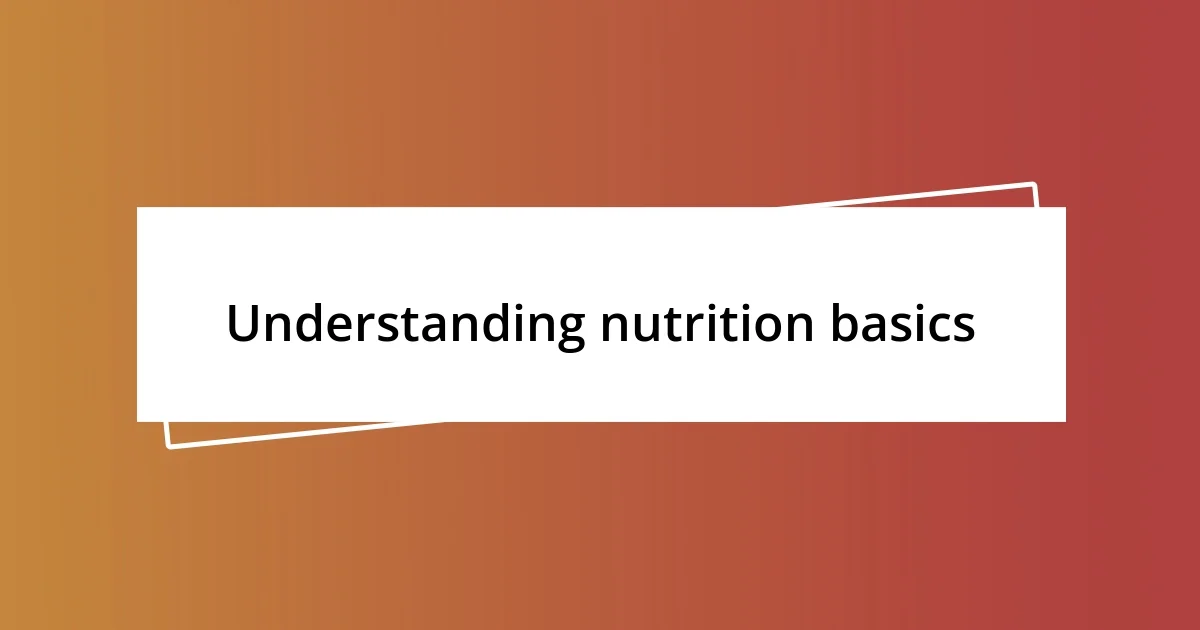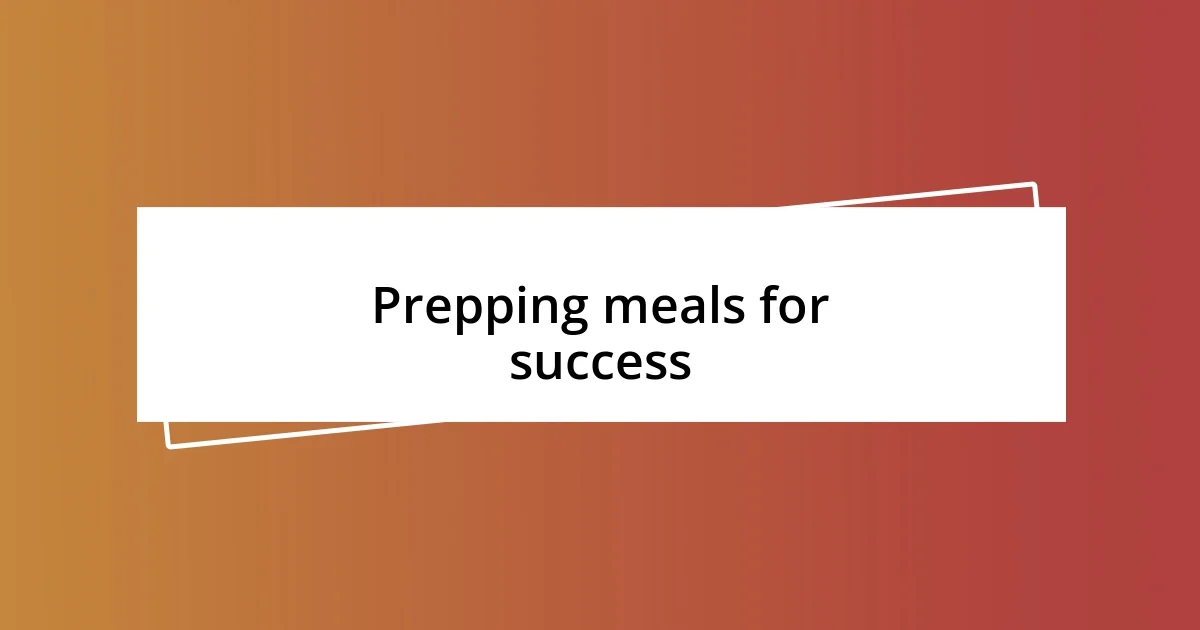Key takeaways:
- Understanding the roles of macronutrients and micronutrients is essential for optimal energy and health.
- Listening to your body’s hunger cues and tracking dietary habits can improve your relationship with food and energy levels.
- Adjusting your nutrition plan based on personal feedback and experiences is crucial for achieving desired health outcomes.

Understanding nutrition basics
Nutrition is the cornerstone of how we fuel our bodies, and understanding its basics can be transformative. I remember when I first learned about macronutrients—carbohydrates, proteins, and fats. It was like a light bulb went on! I realized that each plays a distinct role, from providing energy to building and repairing tissues. Have you ever considered how each meal you eat contributes to your overall health?
I found it fascinating how micronutrients, like vitamins and minerals, support our body’s intricate systems. For instance, I noticed a significant boost in my energy levels after incorporating foods rich in iron and vitamin C. The difference was palpable! When was the last time you really paid attention to these tiny powerhouses in your diet?
While the idea of counting calories might feel daunting, I discovered that listening to my body’s hunger cues was much more effective. I learned to distinguish between genuine hunger and cravings driven by emotions. It’s amazing how this awareness can shift your relationship with food. Have you ever tried tuning in to what your body really needs, rather than just what your mind craves?

Identifying your body’s needs
Identifying your body’s needs is perhaps one of the most crucial steps toward effective fueling. I’ve had moments where I misunderstood my body’s signals and ended up feeling sluggish or overstuffed. For instance, there was a time when I craved something sweet after lunch. Instead of reaching for a pastry, I decided to have a banana, and to my surprise, that simple choice energized me for the rest of the afternoon. How often do we overlook healthier options simply because our cravings steer us off course?
Taking the time to assess your daily energy levels can reveal a lot about your body’s unique requirements. I started keeping a simple food diary, jotting down what I ate and how I felt afterward. It was enlightening to see patterns emerge—like how a high-protein breakfast left me focused and satisfied for hours. This practice opened my eyes to the significance of listening to my body; I learned that quick energy solutions might not be the best long-term choices. Have you ever considered tracking your meals and moods?
It’s also helpful to consider factors such as activity levels, stress, and even sleep when identifying your nutritional needs. I noticed that on days I’d skip my workout, my body craved lighter meals, while after a hefty exercise session, it demanded more substantial nutrients. This connection between how I felt physically and what I needed nutritionally was a game changer. Recognizing these signals made a substantial difference in how I approached my meals. What signals does your body send, and are you tuned in?
| Body Needs | Signs to Look For |
|---|---|
| Energy | Fatigue, lethargy |
| Hydration | Thirst, dry skin |
| Protein | Muscle soreness, increased appetite |
| Micronutrients | Weakness, frequent illnesses |

Choosing the right food sources
Choosing the right food sources has been one of the most enlightening aspects of my nutrition journey. I’ll never forget the day I swapped out processed snacks for whole foods. Instead of reaching for that tempting bag of chips, I opted for almonds and apple slices. The crunch and freshness not only satisfied my cravings but also kept me fuller for longer. Have you ever noticed how whole foods can elevate your energy levels and improve your mood?
When selecting the right foods, I focus on nutrient density over just calories. This means I look for foods that pack a punch in vitamins and minerals relative to their calorie content. Here are some food sources I often choose:
- Leafy greens (e.g., spinach, kale): Rich in vitamins A, C, K, and minerals like iron.
- Berries (e.g., blueberries, strawberries): High in antioxidants, which are fantastic for reducing inflammation.
- Lean proteins (e.g., chicken, fish, legumes): Help with muscle repair and keep hunger at bay.
- Whole grains (e.g., quinoa, brown rice): Provide sustained energy thanks to their fiber content.
- Healthy fats (e.g., avocados, nuts): Important for brain health and satiety.
I realized that shopping for food can be a delightful experience when I shift my focus to these sources. For instance, I always feel a rush of excitement when I fill my cart with vibrant, fresh produce. Each colorful fruit and vegetable feels like a step toward a brighter, healthier me. Have you explored the produce section and felt that same thrill?

Prepping meals for success
Meal prepping has transformed my approach to healthy eating. I remember my first attempt at planning my weekly meals; I spent an afternoon chopping vegetables and cooking grains, and when I opened my fridge to neatly packed containers, it felt like a small triumph. The satisfaction of seeing everything organized made me realize how much easier it was to grab a nutritious meal when hunger struck. How often do we find ourselves reaching for unhealthy snacks simply because we didn’t plan ahead?
I also discovered that variety is key in meal prepping. Initially, I would stick to the same few recipes, but I soon realized that boredom crept in. This led me to experiment with flavors and cuisines. One week, I made a hearty Moroccan chickpea stew, and the next, I tried a zesty Mexican quinoa salad. Each bite was like a mini adventure, and it kept me excited about my meals instead of dreading another bland option. Have you ever felt stuck in a culinary rut? Mixing things up can really reignite your passion for cooking—and eating well.
Another essential aspect of meal prepping that I’ve embraced is portion control. I remember a time when I would cook a large batch of pasta without measuring, only to end up with far more than I needed. When I started using portioned containers, I learned just how much food my body really required. It made a world of difference in preventing overeating and promoting mindfulness around my meals. Plus, having those portions ready to go alleviates the post-workday dilemma of “What should I eat?” Don’t you love the feeling of knowing exactly what’s for dinner without the last-minute scramble?

Incorporating hydration strategies
Incorporating hydration strategies has been a game-changer for me. I’ve discovered that keeping a water bottle close is one of the simplest yet most effective ways to ensure I’m drinking enough throughout the day. It’s been a delightful surprise to notice how just sipping water during my routine—like when I’m working or out for a walk—has improved my focus and energy levels. Have you ever paid attention to how your body responds to hydration?
I also started flavoring my water with fruits and herbs, which has turned a mundane task into a tasty ritual. One of my favorites is lemon and mint—it feels refreshing and invigorates my spirit, especially on hot days. I remember a day recently when I had a migraine and realized it stemmed from dehydration. That experience prompted me to keep a pitcher of fruit-infused water in the fridge at all times. Can you think of a time when a simple change in your hydration habits transformed your day?
Lastly, I’ve made it a habit to drink a glass of water before each meal. Initially, I found it challenging to remember this step, but now it feels second nature. This practice not only ensures I’m adequately hydrated but also helps regulate my appetite. I still recall the first week I committed to this; I experienced less bloating and an overall lighter feeling. It’s fascinating how such a small action can have such a positive impact on my well-being. What about you—have you encountered strategies that significantly improved your hydration?

Tracking your progress effectively
Tracking your progress effectively is truly an integral part of any health journey. I remember when I first started monitoring my food intake and exercise routines, it felt overwhelming at first. However, once I found a tracking app that suited my needs, it became super motivating to see my achievements laid out visually. Have you ever experienced that rush of motivation when you see your efforts paying off?
I also learned the importance of celebrating small victories. For instance, when I hit my hydration goals consistently for a week, I treated myself to a new water bottle. This simple reward system made the process feel more enjoyable and less like a chore. It’s easy to overlook these moments of progress, but don’t you think they deserve recognition? Each little step reinforces our commitment and keeps our spirits high.
Another crucial aspect of tracking progress lies in reflecting on what the numbers mean. For me, logging my workouts wasn’t just about counting reps; it became a way to measure my strength and endurance over time. Once, I noticed that my running pace improved dramatically, and that realization fueled my desire to push further. Have you taken the time to analyze your progress? Understanding our data can provide profound insights and keep us engaged in our journey toward wellness.

Adjusting your plan as needed
Adjusting your plan as needed is a vital part of my health journey. I remember a time when my initial meal plan didn’t yield the desired energy levels. After a couple of weeks, I felt sluggish and realized I had to tweak my carb intake; a simple adjustment revitalized my daily routine. Have you ever found that small changes can make a big difference?
What I’ve discovered is that my body doesn’t always respond the same way. For instance, there was a period when I thought my protein intake was just right, but my post-workout recovery was lacking. After consulting with some nutrition resources, I learned that different types of workouts require different nutrient focuses. Adjusting my protein sources—from plant-based to include some animal proteins—dramatically improved my recovery times. Isn’t it incredible how responsive our bodies can be to what we feed them?
It’s essential to stay attuned to how our bodies communicate their needs. I’ve learned to check in with myself regularly, asking questions like, “How am I feeling today?” If I notice fatigue or discomfort, I revisit my nutrition and activity levels, making adjustments accordingly. This continuous reflection not only enhances my performance but also makes me feel more connected to my body. Have you practiced this self-awareness within your own regimen?














